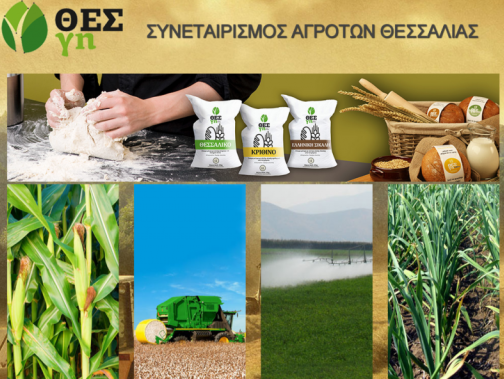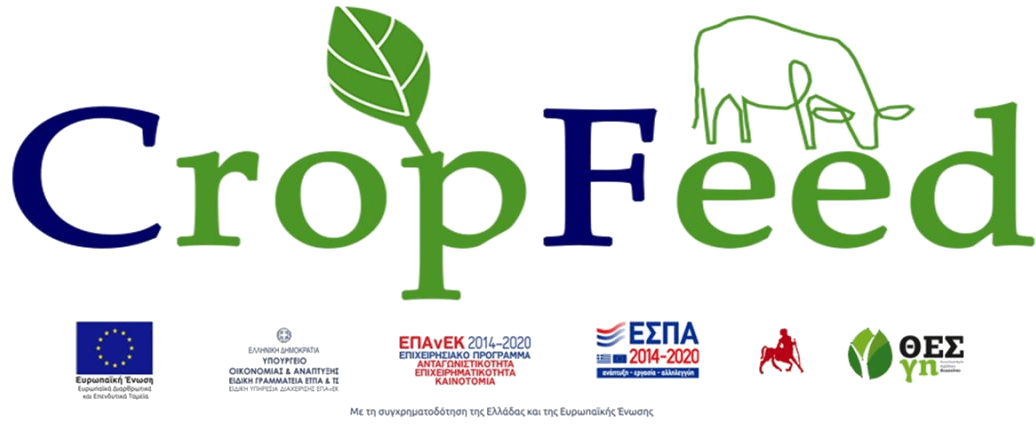NSRF Project CropFeed
Project Information
Title: Establishment of production protocols for feeding cows for milk production
Acronym: CroopFeed
Project ID: Τ1ΕΔΚ-01491
Start Date: 28 June 2018
End Date: 30 September 2022
Funded under: European Union and Greek national funds through the Operational Program Competitiveness, Entrepreneurship and Innovation, under the call RESEARCH—CREATE—INNOVATE
Total cost: € 990.275,00
Coordinated by Laboratory of Agricultural Economics & Consumer Behaviour – University of Thessaly
Overview of the Project
This projects aimed to establish productive feed protocols for silages and concentrates. The crops to be tested are forage and lupine and forage as peas and sorghum and / or switchgrass as spring caltivations, after harvesting of pea for silage. Different experiments will be developed for these crops at experimental and pilot level to meet the dairy cow’s nutritional needs. These protocols will take into account the current fertile conditions and the various fertilization and irrigation programs to be selected, in accordance with the principles of agricultural experimentation. In this proposal participate the Laboratory of Agricultural Economics and Consumer Behavior (AECOB), the Agricultural and Applied Plant Physiology Laboratory (AAPP) and the Laboratory of Entomology and Agricultural Zoology (EAZ) from the Department of Agriculture Crop Production and Rural Development of the University of Thessaly. The enterprises participating are the cooperative THESSGI and the cow farm of Mr. Triantafyllou Polykarpos. AAPP will shape the experimental design of the proposal. The THESSGI cooperative will implement the experimental design that will be designed by the AAPP following the cultivation guidelines that will be the production protocol of each crop. The quality characteristics of the feed produced will be assessed by the AAPP. The efficiency of the inputs used per crop will be assessed by AECOB by the application of the Data Envelopment Analysis (DEA) as an appropriate benchmarking methodology. The EAZ will design protocols to deal with crop pests to be studied at a pre-harvest and post-harvest level. Mixtures of these feeds will then be provided to the cow farm for feeding a number of animals. AECOB will also conduct a consumer behavior survey for feeding purchase by animal feeders at national level. All agricultural experiments will last 36 months and feeding experiments will last 24 months. The result of this combined research effort will be the establishment of production protocols for crops capable of improving the dairy process, by making best use of the inputs used during their production process. This will reduce as far as possible the production cost, increasing the competitiveness of the farms of the cooperative. The cow farm will acquire an integrated nutritional protocol with locally produced species, thereby reducing production costs in a sector characterized by a particularly strong competitive milk production environment. In addition, it will be able to differentiate the final product in a way by setting a sound basis for the implementation of a marketing mix based on the locality of the overall production process. The project seeks to provide viable solutions to serious problems encountered by plant and livestock farms by creating conditions to meet national targets for reducing the dependence of animal production on imported soybeans and increasing the competitiveness of the cow’s milk sector. The results will be published in valid scientific journals, will be presented at scientific conferences and a website will be created where the project will be presented.
Objectives
- The replacement of imported protein feed concentrated with domestic production of lrguminous crops in order to reduce production costs for livestock farms.
- The replacement of the maize silage which is a cultivation of high requirements with other silage crops of lower needs but equivalent nutritional value.
- Design of cultivation protocol focusing on producing appropriate amounts of leguminous crops that will be used in the ration of the dairy cows, with main ingredients Switchgrass (Panicum virgatum L.), the livestock pea (Pisum sativum subsp. arvense L.) and the white Lupino (Lupinus albus).
- Investigation of the adaptability of new production varieties of the multiannual Switchgrass plant.
- Quantification of environmental and economic benefits resulting from the cultivation of reduced inputs.
- Investigation of the energy balance of the proposed crop system, with the aim of reducing the environmental footprint.
- Evaluation of the economic efficiency of both plant and animal production, so that there is full documentation of the viability of the alternative breeding proposal.
- Recording an integrated consumer feed profile from livestock farmers in order to redefine the marketing strategy of the cooperative in the field of animal feed.
Implementation process

- “Laboratory of Αgriculture and Applied Plant Physiology” will propose the appropriate leguminous crops that will be cultivated in fields of the farmers’ Cooperative “THESGI”.
- Farmers’ cooperative THESGI will cultivate the above plants for the production of fodder to meet the nutritional needs of 50 dairy cows.
- Dairy farm of Mr. Polycarpos Triantafyllou will use the previous mentioned production in order to feed 50 dairy cows.
- “Laboratory of agriculture and Applied Plant Physiology” will install experimental fields to investigate the adaptability and best agricultural practices for leguminous crops cultivation.
- “Laboratory of Agricultural Economy and Consumer Behaviour” will be the coordinator of the programme. Its aim is to evaluate the efficiency of all different applied practices that will be implemented in CropFeed project, in order to propose a final protocol that ensures profitability maximization for leguminous crops producers and dairy farm owners, taking into consideration climatic and soil conditions of Thessaly region.
- The production efficiency of cows that will be fed on the new rations will be evaluated in relation to the normal breeding practice of the farm.
- A field survey will be carried out on farmers in order to demonstrate their degree of desire to adopt these feedingstuffs and the price they are willing to pay for them.
- Laboratory of Entomology and Applied Zoology will investigate the population development of Bruchus, Sitophilus and Tribolium in various habitats and conditions.
- Given the fact that there are limited data for insects associated with Lupinus sp., both laboratory and field experiments will be implemented, emphasizing in chemical use avoidance (green fumigation)
- These methods will include a) nitrogen and controlled atmospheres, b) inert materials such as diatomaceous earth and Zeolite and C) low-toxicity insecticides for humans and animals, such as the natural pyrethrum, bacterial metabolites (SPINOSAD) and growth regulators (insect growth regulators, e.g. Methoprene).
Field Trials
Journal Publications
Agricultural Economics and Consumer Behaviour Field
- Investigating the Varying Effect of Attitudes, Behavior and Socioeconomic Charactersitics on the Investment Behavior of Arable Crop and Tree Farmers
- Assessing feasibility of soybean substitution with alternative leguminous crops for South East European countries
- Understanding consumer patterns about meat and dairy products derived from animals fed on locally produced feed [Accepted article]
- Assessing the efficiency of arable crops production
Entomology and Stored Products Protection Field
Agriculture and Applied Physiology Field
This research has been co-financed by the European Regional Development Fund of the European Union and Greek national funds through the Operational Program Competitiveness, Entrepreneurship and Innovation, under the call RESEARCH – CREATE – INNOVATE (project code: T1EDK-01491).

